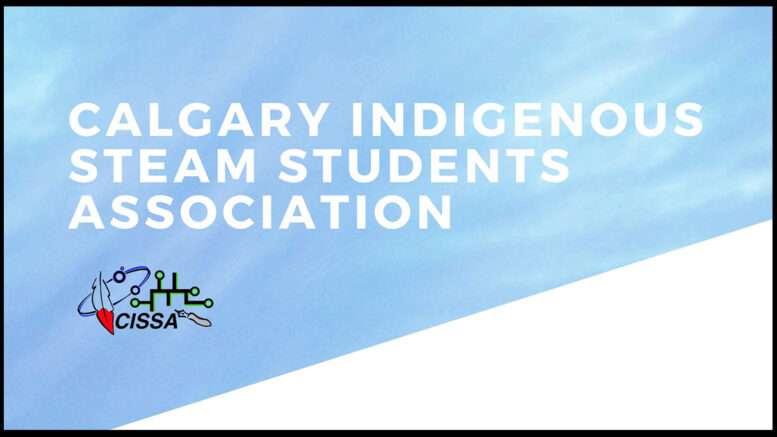by Deena Goodrunning, Local Journalism Initiative Reporter
(ANNews) – Many have said that education is the new buffalo for Indigenous peoples. But, attending educational institutions such as universities can be a lonely and stressful experience for many Indigenous students. That’s why it’s important for support to be in place for Indigenous students attending educational institutions.
At the University of Calgary there exists a student organization that is committed to creating a supportive and inclusive environment for Indigenous and non-Indigenous students in STEAM (science, technology, engineering, arts and mathematics). This organization is the Calgary Indigenous STEAM Students’ Association (CISSA), founded and spearheaded in 2020 by an Indigenous mechanical engineering student named Jasmine McDermott.
The current president of CISSA is Métis student Alexandria McRorie. In an interview on September 21, McRorie shared some insights and information about CISSA with ANNews.
“Our main mission of CISSA is to promote Indigenous engagement in STEAM, facilitate learning opportunities that strengthen our campus community and provide opportunities for professional development for Indigenous and non-Indigenous STEAM students here,” McRorie stated.
McRorie explained that CISSA helps inform students of employment opportunities in industries related to their degrees. And if students are interested in continuing their education, CISSA helps connect them to graduate opportunities at the University of Calgary and at other universities as well.
One way that CISSA helps provide and inform club members of opportunities is through a biweekly newsletter. CISSA often receives emails from various external organizations that are interested in showcasing their available opportunities to student members. Some of these opportunities have included internships with companies such as BioCanRx, Enbridge and Suncor as well as volunteer opportunities with various non-profit organizations. CISSA compiles and highlights these various opportunities in their newsletter which they then send out to members on a biweekly basis.
CISSA has also hosted cultural and social events to help students network, make connections and learn about ways they can get involved within the community. There have also been research nights where students can learn about some of the research taking place on campus and a CISSA mentorship program where senior and junior students are paired together based on mutual goals and interests.
Additionally, every year during the winter semester CISSA hosts an industry week where they have different graduate programs and industry leaders come in and talk to students about the opportunities available to them.
McRorie explained that within the past year a completely new team of executives have taken helm of CISSA. It’s been a big transition year for CISSA, but she and the new team of executives hope to make McDermott proud with what they have planned for CISSA for the upcoming year.
During the interview, McRorie also spoke about how she thinks that being in university is a big accomplishment, and that a student doesn’t need to be in STEM (science, technology, engineering and mathematics) to be successful.
“STEAM is a more inclusive acronym because arts usually gets left out. You don’t need to be in a STEM program to be successful. That’s not the point at all,” said McRorie. “The fact that somebody’s in university is such a big accomplishment. So, we’re trying to recognize that and provide opportunities on all fronts rather than just focusing on that STEM aspect, because I feel like that’s happening a lot nowadays.”
When asked for advice she has for Indigenous students entering university (especially since Indigenous peoples face many barriers in pursuing higher education), McRorie spoke about her own university experience. She was the first person in her family to attend university and for her it was a daunting experience going into university, especially since she didn’t know what was out there and what was available.
So, she said that her biggest advice would be for students to put themselves out there and get involved with the campus community and make connections with other people, because university is a lot easier to go through when you have a support system.
McRorie also mentioned that no matter what university students attend, there are usually specific supports for First Nations, Métis and Inuit Students. She mentioned the Writing Symbols Lodge as a support for Indigenous students attending the University of Calgary. She further iterated on her advice for students to put themselves out there at least just a little bit so that they can make connections and create mentorship opportunities.
“And don’t be afraid to ask questions,” McRorie added. “I know it’s scary, but asking questions is how you get answers. And then by doing so, you can create those relationships that persist throughout university and also after. Try to be involved in any way.”
She pointed out that just being on campus and sitting in areas like the Writing Symbols Lodge can lead to connections and friendships that can help with getting through that first year of university, since the first year of university is always a bit hard.
During the interview McRorie mentioned that CISSA is open to everyone. Non-university people can also join the club, as long as they don’t make up more than one-third of the club’s members.
“We’re open to everyone. We do focus around the First Nations, Inuit, Métis populations just with how our club is structured, but anyone can join. We have a fair amount of non-Indigenous students who are really just trying to learn more about Indigenous culture and just trying to be involved and see what opportunities we have.”
For those interested in learning more about CISSA, more information about them can be found at their official website address: https://www.cissa-uofc.com/.



Any program that has race as a qualification is against basic human rights.